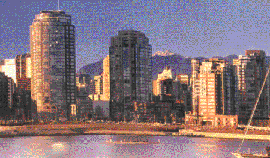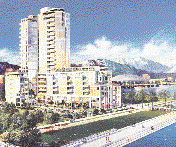ASIAN CANADA
Page 5 of 5
The success of Asian restaurants in Toronto is a good barometer of the cultural influence Asians have on the land they now call home. Take Thai Shan Inn in the borough of York, for instance. It's a small, hole-in-the-wall restaurant that consistently has lines of customers waiting outside for a table in the jam-packed interior. Even during bitter winter cold, hungry people are waiting to get in. You can try calling ahead, but reservations aren't guaranteed.
| "Many Asians are playing golf at Park View or Thunderbird's. Some go to expensive courses like Glenaddy or Lakeview." |
Corean restaurants line Bloor Street, between Christie and Bathurst. Stroll down Spadina between Dundas and College for dozens of Chinese and Vietnamese restaurants. Just north of Dundas, on Baldwin, you'll find Malaysian. Often you'll catch hordes of people of all colors lined up outside Chinatown restaurants at two or three in the morning. Some residents argue, however, that the best restaurants are found in the suburbs, where the wealthier Asians live; Richmond Hill, Mississuaga and Agincourt have become famous for dim sum.
Kensington Market lies just west of Chinatown. While not distinctly Asian, the Asian presence is strong in this Old World-style market. Self-contained, narrow streets packed shoulder-to-shoulder with tourists and shoppers feature every kind of shop--bakeries, butchers, fisheries, nick-nacks.
This Asian Canadian boom has drawn opportunistic demagogues looking to finger scapegoats. Markham's deputy mayor, Carole Bell, last year made statements blaming Chinese immigrants for making certain areas of Toronto less desirable. Her comments sparked outrage throughout the city.
"The bottom line is that virtually all immigrant communities have faced this brand of hostility in Canada [at one time or another]," B'nai Brith Canada's executive vice president Frank Dimant responded. "Deputy Mayor Bell's remarks demonstrate either her own blatant racism or a total lack of moral courage in confronting the racism of others. In either case, we are dealing with an elected official who is using xenophobia as a platform to attract support. This is utterly unacceptable in the Canada of today."
The Canadian Italian Business and Professional Association issued this statement: "Unfortunately, the approach you have taken has become very divisive, causing increased polarization which has moved you and those you support further away from a solution rather than closer to one. We sincerely hope that your remarks, as racist as they appear, have been misquoted and, if not, that you will take immediate action to correct them."
Bell refused to apologize for her remarks and was eventually forced by the town council to sign a statement indicating that her own personal view does not reflect that of the town.
"It was high profile news," says Ng. "Chinese media reported in on the front page every day. Today, people generally feel that there is much more cooperation between communities and the town government. Everybody realizes that things are changing for the better."
Ng cites Markham's Mayor Frank Scapitti who works closely with Asian Canadian businesses and organizations. He carries the torch that Mayor Tony Roman first lit about 6 years ago. Roman helped establish Asian business and social organizations. "If people came to greater Toronto, he would encourage them to come to Markham."
Markham has the greatest income bracket in metro Toronto, and the business opportunities are rapidly growing due to the welcome mat Mayors Roman and Scapitti have laid. The houses are new, the school system is well-respected and taxes are generally lower than Toronto proper by 25-33%.
The Asian Canadian impact has sparked the interest of AsiaAmerica, a joint venture between American International Group--the U.S.'s largest commercial and industrial insurance underwriter--and China's state insurer. AsiaAmerica opened its first Canadian office in Toronto in January 1995 and this year opened a second in Vancouver, targeting the rapidly growing Asian Canadian business market.


Vancouver's Concord Pacific Place is billed as Canada's first fibre optic community, with a 45-Mbps connections for every home and office. It's the first stage of an ambitious 15-year, $3 billion development headed up by 33-year-old Chinese Canadian Terry Hui. |
"A lot of people want to be rich. Money is very popular," says Councillor Cho, who has more of a brotherly attitude towards his fellow Canadians. During Cho's two terms, he has raised 30,000 pounds of food for the Canadian foodbank. "Money is important. It's something we need. But it shouldn't be a main goal."
Cho would like to see his two sons do medical work in third world countries. "A lot of Corean Canadian students are interested in medicine. It's a well-respected profession." And it's the perfect profession for golfers. "Many Asians are playing golf at Park View or Thunderbird's. Some go to expensive courses like Glenaddy or Lakeview."
And at night, the Far East Theatre is often filled to its 650 seat capacity with fans of Hong Kong cinema and Japanese anime. At the Far East, they don't kick you out when the movie's over. Buy a ticket and you can stay all day. Plenty do. The Toronto area used to have five Asian cinema houses. The laser disc and videotape changed all that. Only two remain, but they're usually packed.
Theaters, restaurants, golf courses, shopping malls, high-tech neighborhoods--all of them packed with Asians. And side by side with them are the rest of a multicultural Canada.
"I moved here because Canada seemed to me the greatest country in the world," says Cho. "My expectation was correct." Return to Tea Features
| Page 1 |
2 |
3 |
4 |
5 |
CONTACT US
|
ADVERTISING INFO
© 1996-2013 Asian Media Group Inc
No part of the contents of this site may be reproduced without prior written permission.
